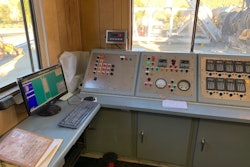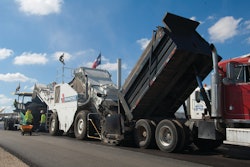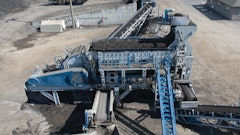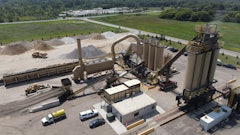
It’s no secret: Data is today’s most valuable commodity. Recent reports have shown we have created 90% of the world’s data in the past year, but we are only using 1% of that data effectively. And that percentage is probably even less in the construction industry.
The construction industry is an industry notorious for lagging years behind in terms of technology. However, making use of data and the solutions it provides will start to separate industry leaders from the rest of the pact. At the asphalt plant especially, efficiently monitoring data can help save asphalt producers time and money daily while also helping prevent catastrophic shutdowns.
The problem, however, is where do asphalt producers even begin to get their arms around data management.
“Often you hear everybody's getting pounded with data,” Ted Christian, strategic account manager with WEM Automation says. “Everybody will tell you that they've got an access to an enormous amount of data at their fingertips now but they don't know what to do with it. What they need to know is how they can gather meaningful data that can change how they operate their plant from the reports that are available to them and that starts with looking at what problems you’re trying to solve at the plant and then analyzing the data based on that.”
To get the most out of the data available to you at your asphalt plant, automation companies suggest asphalt producers start looking at their operations day to day and looking at their pain points to seeing how can data kind of help them sort through and overcome those challenges.
“Monitoring data allows operations to run their plants for peak performance, profitability and safety,” Ken Cardy, president of Libra Systems says. “The plant’s Overall Equipment Effectiveness (OEE) can also be calculated to help management visualize and eliminate equipment losses and waste.”
Data Targets Where Waste is Happening
Reducing waste at your asphalt plant is paramount to saving your company time and money. Reductions in raw materials used (whether it is aggregate and asphalt, burner fuel or equipment fuel) means plant owners can buy less to produce the same amount of material. These savings should go directly to the bottom line for any producer. Accurate orders, limiting the number of mix changes and knowing plant timing will all reduce waste generated every day you produce asphalt mixtures.
Data management can help with all those things.
“With automated processes, onsite inventories become much easier and much more quantifiable,” Christian says. “Data management tools can then help bring greater reconciliation to inventory management.”
Another data point that can help identify and reduce waste is in monitoring energy usage.
“These asphalt plants run a lot of horsepower so if you measure how much you're spending on fuel by monitoring fuel consumption, you can track your input costs,” Christian adds. “More and more data can help determine where fuel costs increase and why.”
Christian says that many software manufacturers generate reports for their clients that specifically focus on reducing and eliminating waste by drilling down to the specifics. That means asphalt plants can use data to measure their moisture contents in relation to fuel consumption and use the reports to find other areas where their plant may be generating unnecessary waste.
Improve Safety & Reduce Downtime
While reducing waste is a huge opportunity for producers to save money, data provided by plant automation can help improve operational efficiencies which will also positively impact your bottom line.
“One of the things data tries to do is create process enhancement and behavioral change,” Christian says. “What data does, is it creates trends surrounding your asphalt plant and those trends can give you the ability to spot performance issues and the ability to plan scheduled maintenance before a bigger problem occurs.”
In addition, Christian says the Internet of Things, coupled with the increase to the remote access of data, is improving how producers get data into the hands of people that need it quicker, allowing for faster troubleshooting. This not only prevents catastrophic breakdowns, but also allows producers to schedule around their maintenance needs.
“By tracking the run-time of each piece of equipment, maintenance or calibration can be performed proactively, rather than reactively,” Cardy says. “Plant downtime can then be scheduled; not forced.”
Understand the Data
While all the data in the world is great, it means nothing if no one is tasked with interpreting it. Asphalt producers need to take the time to invest in understanding the data that is available to them and how it can improve their operations.
“Whatever control system it is that you're using, the first thing you need to do is have a good depth in depth understanding of the functional capabilities of your reporting package,” Christian says. “Producers need to have full functional knowledge and understanding of what they have available to them, what other data they may have access to and how to extract it.”
Software manufacturers know their systems inside and out and can help producers create data dashboards to help them get the most out of the data coming in and to help them generate the most meaningful reports.
“Dashboards help to make the data more digestible by showing it in more manageable ways, but that means nothing without a full understanding of your package capabilities,” Christian adds.
At the end of the day, the more time you put in to understanding the data your asphalt plant can provide you, the more you will end up getting out of it. Work with software companies to find out where your plant should start investing and obtain onsite training for your data packages to get the most out of your investment. If all you see are dollar signs laid out before you when you look at automation packages and are unable to get past the investment expense, your plant may not be ready to make the leap. However, those that do will continue to be ahead of their competition.
“By using automation tools and assessing data, many asphalt producers have reduced their material margins to a bare minimum,” Cardy says. “Some producers question the return on investment, however for those that implement data management solutions, you could never take it away from them. They rely heavily on the data to run their daily operations at peak production and efficiency.”
However Cardy says there is still potential for producers to learn more about their asphalt plants to improve operations.
“There is a yet-untapped area that can be optimized for greater profitability – fleet management & asset tracking,” he says. “Asset management solutions that integrate with the rest of your product suite can help producers realize these additional revenues.”
If you’re at a loss for how to reach any data-focused goals, maybe a move you make in 2020 is to dedicate time to the task or maybe hire someone equipped to build and oversee your company’s technology initiatives. As an industry, we’ve seen the changes that can happen in a few short years. Don’t wait until the next big changes comes around to try to catch up. You may not be able to.




















